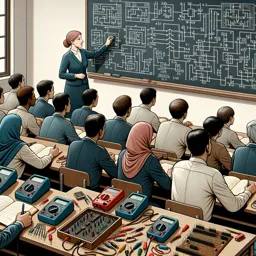Introduction to Basic Electronics
Electronics form the backbone of modern technology, influencing everything from smartphones to household appliances. For aspiring electricians or anyone interested in professional courses, understanding the foundational concepts of basic electronics is a crucial first step towards a rewarding career in the electrical field.
What Is Basic Electronics?
Basic electronics involves the study of the physical components and principles used to control and manipulate electric current. It encompasses everything from simple circuits to essential electronic devices and their operation.
Essential Components in Electronics
- Resistors: Devices that limit the flow of electric current and are fundamental for controlling voltage and current within circuits.
- Capacitors: Components that store and release electrical energy, commonly used for filtering, timing, and smoothing voltage fluctuations.
- Inductors: Coils that store energy in a magnetic field, often employed in filtering and tuning applications.
- Diodes: Components that allow current to flow in one direction only, protecting circuits and enabling rectification processes.
- Transistors: Semiconductors that can amplify signals or act as switches, forming the basis of modern electronics.
Understanding Electric Circuits
An electric circuit is a closed path through which electrons flow. Circuits consist of sources of electricity (like batteries), conductive paths (wires), and electronic components that control the current’s behavior.
Types of Circuits
- Series Circuits: Components are connected one after another, so the current flows through each part sequentially.
- Parallel Circuits: Components are connected across the same voltage source, providing multiple pathways for the current.
Basic Electronic Tools
Electricians and electronics enthusiasts rely on tools such as:
- Multimeter: Measures voltage, current, and resistance.
- Soldering Iron: Connects electronic components permanently.
- Breadboard: Allows for building and testing circuits without soldering.
- Wire Strippers: Remove insulation from electrical wires for connections.
Safety in Basic Electronics
Safety should always be the top priority. Here are essential tips:
- Always disconnect power sources before working on circuits.
- Use insulated tools to prevent electrical shocks.
- Verify circuit voltage and current before handling components.
Why Study Basic Electronics?
Gaining a solid understanding of basic electronics opens up numerous career opportunities in the electrical and electronic sectors. It lays the groundwork for advanced studies, hands-on work, and troubleshooting in real-world scenarios.
Conclusion
Learning about basic electronics is an invaluable part of the journey to becoming a proficient electrician. Master these fundamentals, and you’ll be well-equipped to progress to more complex and specialized areas in the world of professional electrical courses.































